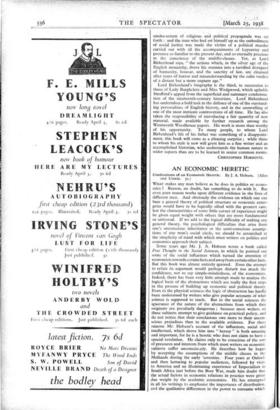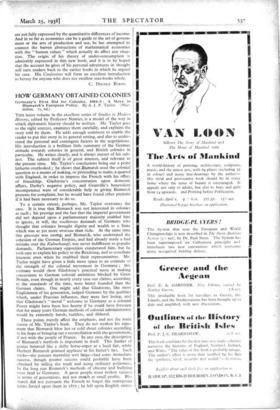AN ECONOMIC HERETIC
Confessions of an Economic Heretic. By J. A. Hobson. (Allen and Unwin. 5s.) WHAT makes any man believe as he does in politics or econo- mics ? Reason, no doubt, has something to do with it. But even pure reason works upon different evidence in the lives of different men. And obviously the evidence on which one can base a general theory of political structure or economic enter- prise would have to be logically sifted with the greatest care, lest the characteristics of some little corner of experience might be given equal weight with others that are more fundamental or universal. jf we add to the logical difficulty of making any general theory, the psychological difficulties that arise from one's unconscious inheritance or the semi-conscious assump- tions of any man's social circle, we should be astonished at the simplicity of mind with which most writers on politics and economics approach their subject.
Some years ago Mr. J. A. Hobson wrote a book called Free Thought in the Social Sciences, in which he pointed out some of the social influences which turned the attention of economists towards certain facts and away from certain other facts. But this book was almost entirely ignored. Even the attempt to refute its argument would perhaps disturb too much the confidence, not to say simple-mindedness, of the economists. Indeed, there has been very little attempt made to analyse the logical basis of the abstractions which are really the first steps in the process of building up economic and political theory. Even in the physical sciences the logic of abstraction has hardly been understood by writers who give popular accounts of what science is supposed to teach. But in the social sciences the ignorance of the nature of the abstractions from which they originate are peculiarly dangerous ; because most writers on these subjects attempt to give guidance on practical policy, and do not notice that their conclusions owe more to their uncon- scious prejudices than to the available evidence. For these reasons Mr. Hobson's account of the influences, social and intellectual, which drove him into " heresy " is both amusing and important, for he is a heretic who does not claim to have a special revelation. He claims only to be conscious of the sort of pressures and interests from which most writers on economic subjects suffer unconscioisly. He describes how he began by accepting the assumptions of the middle classes in the Midlands during the early 'seventies.. Four years at Oxford. and then lecturing to popular audiences, followed by visits to America and an illuminating experience of Imperialism in South Africa just before the Boer War, made him doubt that the actual factors in economic relations in practice were given due weight by the academic economists. He has attempted in all his writings to emphasise the importance of distribution, and the qualitative differences in the power to consume which
are not fully expressed by the quantitative differences of income. And in so far as economics can be a guide to the art of govern- ment or the arts of production and use, he has attempted to connect the barren abstractions of mathematical economics with the " human values " which actually do affect any situa- tion. The origin of his theory of under-consumption is admirably expressed in this new book, and it is to be hoped that the account he gives of his personal adventures in thought will turn readers back to the earlier books in which he argued his case. His Confessions will form an excellent introduction to heresy for anyone who does not swallow text-books whole.
C. DELISLE BURNS.











































































 Previous page
Previous page